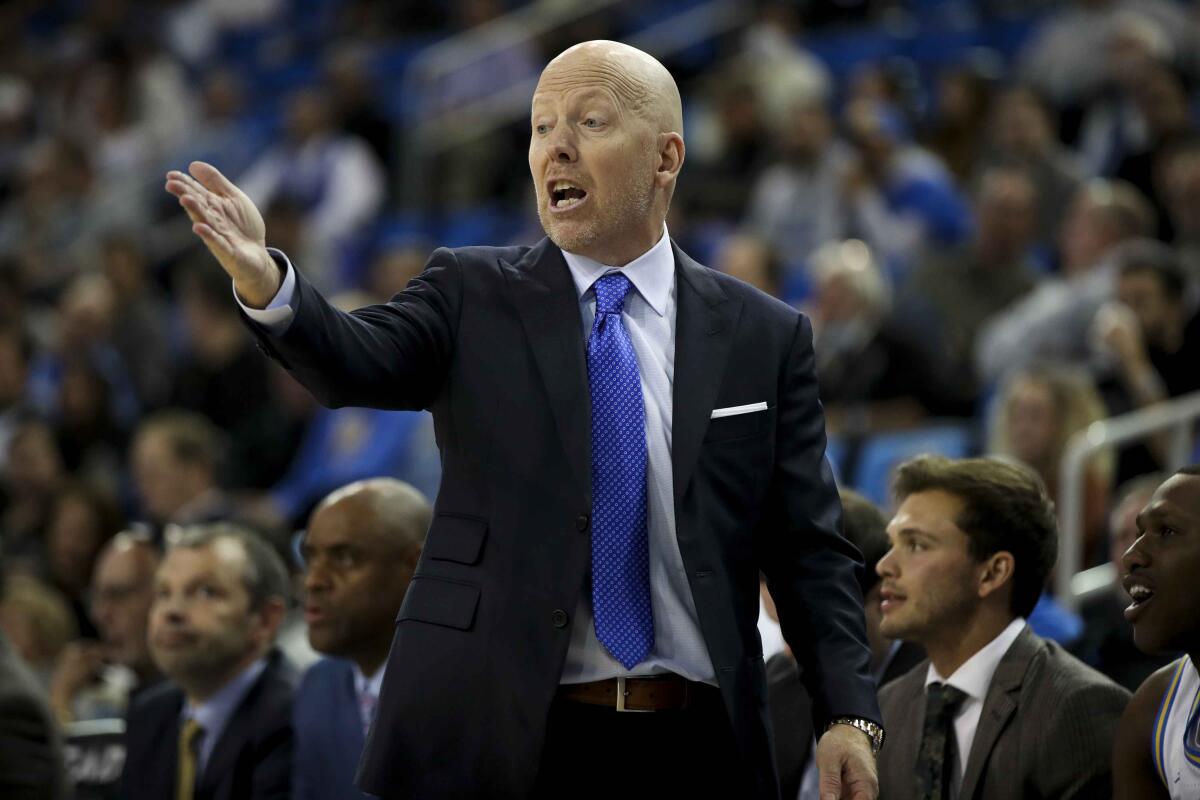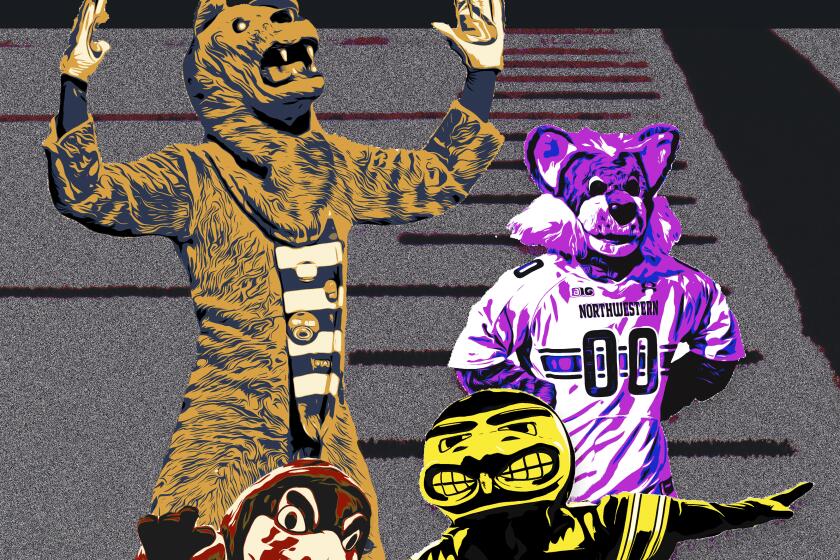Mick Cronin on realignment: ‘None of it is in the best interest of the student-athlete’

- Share via
College sports administrators have touted the benefits of conference realignment for their athletes. Increased exposure. Better competition. More money for nutrition, mental health and academic support, not to mention the stability of athletic departments that otherwise might have to cut teams.
Count UCLA basketball coach Mick Cronin among those who aren’t buying it.
Any of it.
“None of it is in the best interest of the student-athlete, no matter what anybody says,” Cronin, whose team will compete in the Big Ten starting in the 2024-25 season, said Thursday. “It’s in the best interest of more money to cover the bills. That’s it.”
How did the Pac-12 die? These surprising decisions by USC, Oregon, Washington and others thwarted efforts to save the conference.
Cronin pointed to all the athletic departments in the red — a list that includes UCLA, which faces a four-year shortfall of $130.8 million — and the behind-the-scenes accounting that is not widely known as factors sparking so much movement.
“The problem is the public doesn’t understand the scope of why it’s all even happening,” Cronin said. “Like, the public thinks right now that I have the 12 guys on scholarship and they go to UCLA for free. They don’t realize the athletic department at UCLA has 25 sports and 700 kids on scholarship that they have to pay the university for those scholarships. That, right there, 99% of the people do not know that.
“So why do these schools need all this money? There’s about four athletic departments that actually make money in the entire nation because of scholarship bills and budget expenses, so this all happened because of money, that’s just a reality. It’s not all because of football. And what I would tell you is, this is not the end-all fix. It’s far from over.”
Stanford, California, Oregon State and Washington State all face uncertain futures, whether it be as part of a Pac-12 fortified with schools from the Mountain West and American Athletic conferences or as absorbed members of other conferences.
UCLA’s fate is assured, at least for the foreseeable future, alongside that of USC. But the Bruins have plenty of work to do on their bottom line.
Cronin noted that many athletic departments are propped up by their universities “and they don’t want to supplement them any more than they already are.” At Cincinnati, Cronin said, the Bearcats athletic department received the second-highest amount of campus support in the nation because of the lack of a lucrative television contract.
Unlike many schools, UCLA receives just a pittance from campus sources. During the last fiscal year, the Bruins received a combined $2.57 million in student fees and direct institutional support, a small fraction of the $31.3 million that Cal received in those categories (minus a $2.2-million deduction for transfers to the school). That campus support left the Golden Bears’ athletic department with a budgetary surplus of $3.7 million.
Another potential huge expense looms: revenue sharing with players.
“Where is this going to be in five years or whenever the ruling comes down [that] you’ve got to pay the players revenue?” Cronin asked. “Where is that money coming from?”
Media rights?
“We’ve already exhausted all the media rights money,” Cronin said. “That’s the problem.”
Cronin said there’s also a misconception that football is to blame for coast-to-coast conferences that will require athletes to fly five hours.
“Football is not the problem,” Cronin said. “We’re all changing leagues because of football? No, no, no. We’re changing leagues to pay the bills for all the sports. Because you have one or two that are revenue sports, if that, at certain schools. The model is they’ve paid for all the other sports forever, and all the bills have gotten too big. So, you gotta do what you’ve got to do to be able to pay ’em. So, it’s unfair to say football is the problem; they’ve been the answer.
“Obviously, here, basketball makes money, and some places women’s basketball makes money. ... Here, I think, gymnastics breaks even or makes some money. So, you have your exceptions, but there’s just not enough money at the current structure of the way college athletics is.”
So what’s the answer?
In exactly one year, USC and UCLA will leave the Pac-12 and join the Big Ten. The schools have embraced detailed game plans to help them thrive.
“If somebody came down from Mars right now or Coach [John] Wooden came back, I mean, he would say, ‘What is going on?,” Cronin said, laughing. “What do you mean there’s no more Pac-12? What, what, what do you mean this school’s in that conference, that school’s in this conference?’
“And if you gave him five minutes, he would solve it. But that would take too much common sense. And when there’s this kind of money involved, people are trying to make money. It is what it is. But if they would let him, he could solve it in five minutes if he could come back.”
How long would it take Cronin?
“Seven,” Cronin said. “He’s much smarter than I am. But the problem is some people’s kingdoms and their piles of money that they make to run their kingdom may change. So, back to the original answer, we are where we are because we’re a capitalistic society. College sports, to say it’s all about education and the student-athlete? C’mon. I’ll leave you with that.”
Contract dispute
The general manager of UCLA freshman Aday Mara’s former Spanish club team, Casademont Zaragoza, confirmed in an email to The Times that the team was suing the 7-footer for breach of contract.
Jose Artigas said the team is seeking 560,000 Euros — roughly $608,000 in U.S. currency — as an exit fee after Zaragoza failed to show up for a scheduled medical examination with the team.
“We want him to fulfill the contract,” Artigas said, “and if he wants to leave, he must pay.”
Cronin said he couldn’t comment on the legal dispute, noting that Mara had been cleared by UCLA compliance and had obtained legal representation.
“I know this: The guy [is] on a scholarship and he’s just a young kid trying to chase his dream in America,” Cronin said. “His mom’s an educator and was a volleyball coach, and the guy just wants to chase his dream. So, can you blame him?”
More to Read
Go beyond the scoreboard
Get the latest on L.A.'s teams in the daily Sports Report newsletter.
You may occasionally receive promotional content from the Los Angeles Times.













